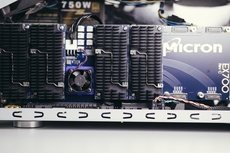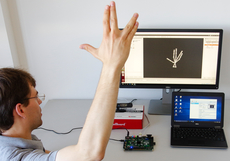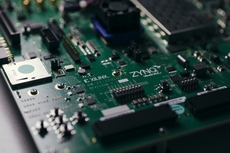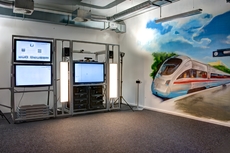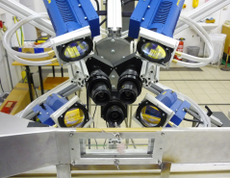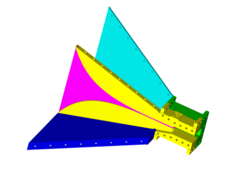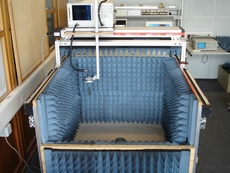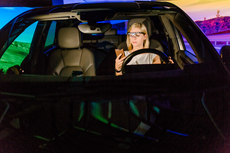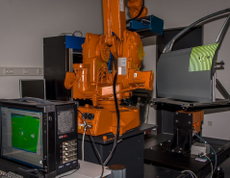Research Groups at IIKT
Chair for high frequency- and communication technology
Prof. Dr.-Ing. habil. Holger Maune
The chair represents the two fields of research and teaching in radio frequency engineering and communication technology. In addition to fundamental research in these areas, the main focus of the chair is on electromagnetic imaging (ground penetrating radar), indoor positioning (real-time localization and tracking), metrological material characterization and RF circuitry technology. Students are welcome to participate in the chair's research within the scope of technical projects, bachelor and master theses. In well-equipped laboratories, measurements can be taken or prototypes built up.
Chair of Integrated Electronic Systems
The Chair of Integrated Electronic Systems represents the design of hardware-implemented electronics in research and teaching. In research, the chair focuses on future-oriented tasks such as e.g. electromobility, autonomous driving, Industry 4.0, Internet of Things (IoT) and robotics. An important aspect in the research of the chair is the design of electronic circuits and systems from low frequencies (analog, mixed-signal circuits) up to the high millimeter-wave frequency range for novel applications, such as robust automotive electronics, radar sensors, industrial sensors and ultra-low power circuits for sensor networking and electronics for biomedicine.
Chair for cognitive systems
Prof. Dr. rer. nat. Andreas Wendemuth
The Cognitive Systems group has in-depth knowledge in speech recognition, emotion and disposition recognition from speech, and their application in human-machine interactions. The focus is in the recognition of user emotions and - dispositions and the user-situatedness of spoken language, i.e. how the user is embedded into his environment and what intentions are pursued by the user. Crucial investigations include the labeling, speaker adaptation, analysis and design of dialogues in human-machine interaction, especially in the border area of possible dialog disruptions. Another focus is drawn on data fusion to enable a classification and evaluation of parallel incoming multimodal data strings.
Research focus:
- Intelligent Dialogue Management Strategies and Companion Systems (DFG: SFB TRR 62)
- Autonomous Driving: Higher Safety by Detecting Driver Conditions (EU: ADAS & ME)
- Ambient Assisted Living: intelligent sensors for home assistance (BMBF: Mova3D)
- Detection of indirectly expressed actions: generic models in human-machine interactions (BMBF: MOD3D)
- Multimodal assistance systems with multiple-person situations: Understanding of the interaction (LSA: IAIS)
Chair of hardware-oriented technical computer science
The chair Hardware-Oriented Technical Computer Science researches new architectural concepts for the realization of runtime-adaptive, performance- and energy efficient digital systems. Both dedicated hardware accelerators in the basis of dynamical reconfigurable FPGAs and combined hardware/software systems are considered. Applications from embedded systems and high performance computing are of interest, since their contradicting requirements on energy efficiency, flexibility, performance, and size prohibit a realization with traditional hardware- and software solutions. Of special interest are applications such as database systems, sensor fusion in medical context, and electronic image correction.
Research focus:
- On-chip interconnect architectures for 3D SoCs, especially Network-on-Chip (NoC)
- Runtime-adaptive (hybrid) hardware/software systems
- Partial reconfiguration of FPGAs
- Heterogeneous system architectures
- Processing of multimodal data for human computer interaction
Group Mobile Dialog Systems
Jun.-Prof. Dr.-Ing. Ingo Siegert
In recent years, the trend towards mobile, ubiquitous interaction raised due to emergence of speech assistant systems such as Siri, Alexa & Co. These (mobile) dialog systems should be able to recognize their interlocutor, adapt quickly to new situations and conduct a natural dialogue involving a variety of user signals. These user signals have to be detected and evaluated robustly under limited resources and with low data bandwidth. Furthermore, the mobile dialog system must also correctly operate under different acoustic environments or in the event of interference signals.
The professorship Mobile Dialogue Systems is therefore located at the intersection of the research areas speech signal processing and human-machine interaction and deals with the topics of affective computing and dialogue modelling. The focus in teaching is on information processing, speech recognition, speech dialog systems and smart systems in industry with LabView.
The following research questions are in the focus:
1. Which influence do recording devices and transmission paths have on the detection of affective Conditions in dialog modelling and how can this influence be compensated?
2. How can more natural dialog achieved and how can the user intention be modeled?
3. How should user-centered assistance systems be implemented in a mobile environment?
Group for neuro-information technology
apl. Prof. Dr.-Ing. habil. Ayoub Al-Hamadi
The professorship for Neuro-Information Technology (NIT) is located technically at the intersection of the research fields multisensory information gathering and processing, human-machine interaction (HMI) and information perception. This involves at first the use of modern methods of information technology and pattern recognition for signal, image and video-based industrial and medical applications. In addition to exploration and research of algorithms and interaction techniques for specific areas, the claim is to develop even more versatile techniques in real application areas (like prototype), such as medicine, security and mobility, and automotive and production.
Research focus:
- 3D object recognition and measurement
- Object tracking and event detection
- Facial expression based emotion and gesture analysis as well as action recognition
- Handwriting recognition and interpretation
- Multi-robot plan recognition and self-organization
The adjunct professorship Neural Systems
Hon.-Prof. Dr.-Ing. Udo Seiffert
The adjunct professorship Neural Systems complements the profile of the Institute for Information Technology and Communications in research and teaching. In research, the focus is on image and signal processing with machine learning, especially neural networks, and in teaching on the courses Artificial Neural Networks and Genetic/Evolutionary Algorithms. In addition, bachelor's and master's theses as well as dissertations are supervised in this area.
Research focus:
- Development and application of machine learning paradigms in the context of image and signal processing.
- Modelling and processing of high-dimensional functional data for industrial applications, especially in the field of multi- and hyperspectral sensor technology.

